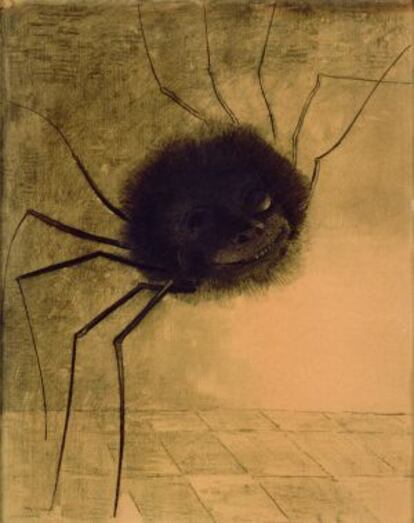The odd oeuvre of Odilon Redon
The unorthodox French artist is re-examined in Madrid

The idea of "styles" has proved an efficient tool for ordering works of art. It calms people to be able to recognize a work as Baroque or Impressionist, believing that classifying means understanding. But more and more works - and even entire bodies of works - do not conform to such categorizations. Such is the case with that of Odilon Redon (1840-1916), an important artist because of the subjects he tackled, the form in which he tackled them and, above all, because he was able to widen the scope of esthetic interest into then-unexplored areas and exercise an influence over his contemporaries. This is one of the reasons that until now, almost 100 years after his death, no retrospective of this French painter has been mounted in Spain.
Redon was a strange man who was a contemporary of the Impressionists without being one; who was close to Symbolism without letting himself become trapped by their esthetic approach; who searched for beauty in expressions of the ugly, even the repulsive; and who carved out a standalone body of work that nevertheless served as a point of support for both the Nabis and the Surrealists.
The Mapfre Foundation's exquisitely presented exhibition helps to understand Redon's character as much as the evolution of his work via an extensive collection of pieces of different formats and origins. His well-known works - which are presented in isolation in museums and exhibitions as well as history books, situated at the margins of the great art movements - belie the fact that a clear trajectory runs through the work of this curious painter.
The influence of Goya, who died in Bordeaux 12 years before Redon was born there, is clearly visible in both his love of engravings and the subjects he tackles: disasters, desires, dreams and nightmares. On top of this is a curiosity for certain scientific themes, such as microscopic vision and Darwin's theory of evolution, as well as an interest in literature that ranges from Shakespeare's A Midsummer Night's Dream to Edgar Allan Poe's supernatural tales.
Redon is not an illustrator but an interpreter who goes far beyond inventing cyclopes or insects with human faces. Perhaps one of the biggest contradictions the exhibition resolves is the juxtaposition of this unreal world, created in black tones, with his creation of delicate flower vases and decorative floating gardens, which are richly colorful and bright. Here history helps us as his proximity to the poetic symbolism of Mallarmé and the music of Debussy, both linked to the love of the Oriental at the time, explains the creations of his later years that searched for a fugitive beauty.
The problem of Odilon Redon is not so much knowing how to classify him in a style, but that his work calls into question the historiographical conventions on which our small academic world is based.
Odilon Redon (1840-1916). Until April 29 at Salas de Exposiciones Recoletos, Fundación Mapfre Instituto de Cultura, Paseo de Recoletos 23, Madrid. www.exposicionesmapfrearte.com/odilonredon
Tu suscripción se está usando en otro dispositivo
¿Quieres añadir otro usuario a tu suscripción?
Si continúas leyendo en este dispositivo, no se podrá leer en el otro.
FlechaTu suscripción se está usando en otro dispositivo y solo puedes acceder a EL PAÍS desde un dispositivo a la vez.
Si quieres compartir tu cuenta, cambia tu suscripción a la modalidad Premium, así podrás añadir otro usuario. Cada uno accederá con su propia cuenta de email, lo que os permitirá personalizar vuestra experiencia en EL PAÍS.
¿Tienes una suscripción de empresa? Accede aquí para contratar más cuentas.
En el caso de no saber quién está usando tu cuenta, te recomendamos cambiar tu contraseña aquí.
Si decides continuar compartiendo tu cuenta, este mensaje se mostrará en tu dispositivo y en el de la otra persona que está usando tu cuenta de forma indefinida, afectando a tu experiencia de lectura. Puedes consultar aquí los términos y condiciones de la suscripción digital.








































